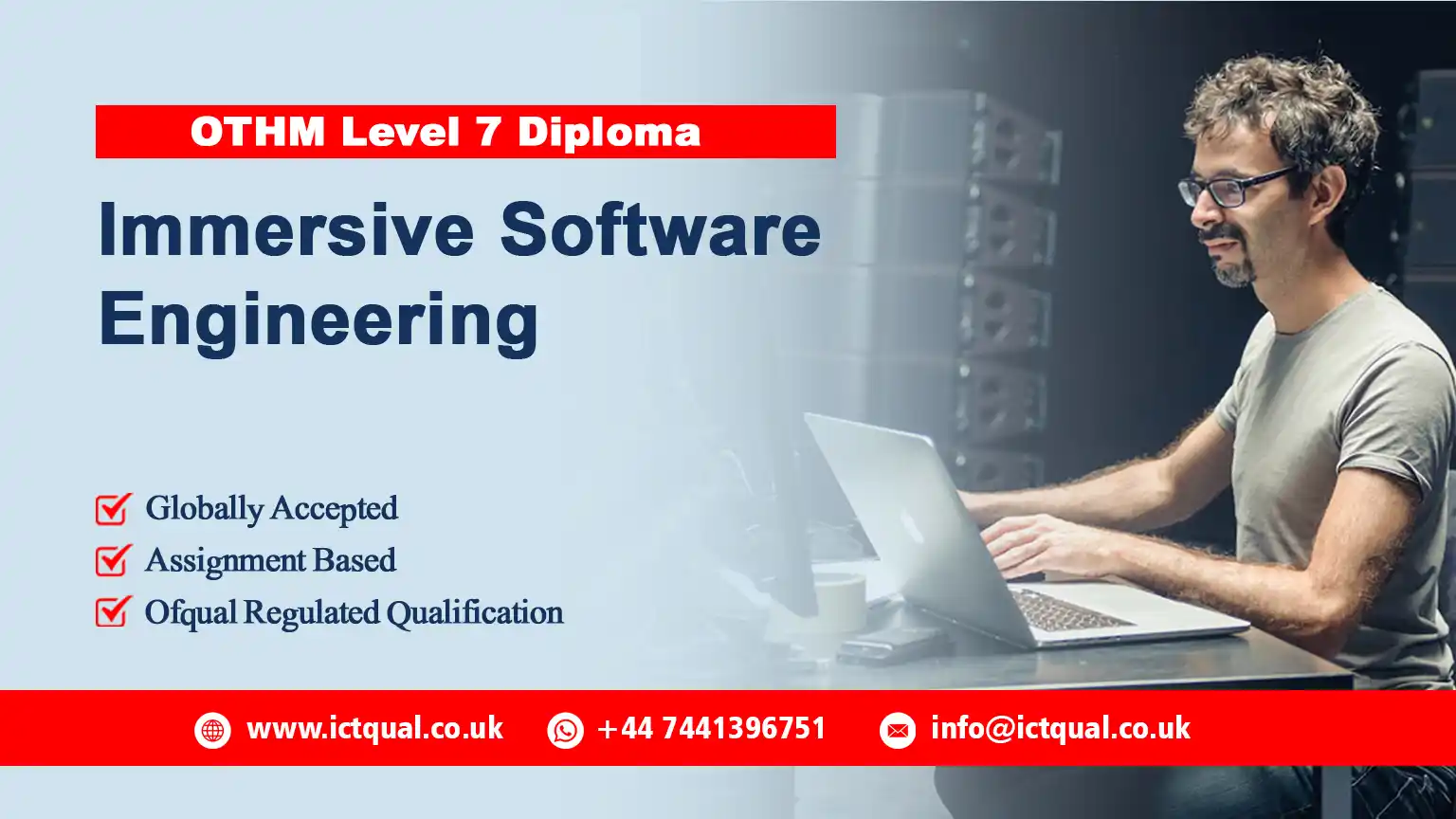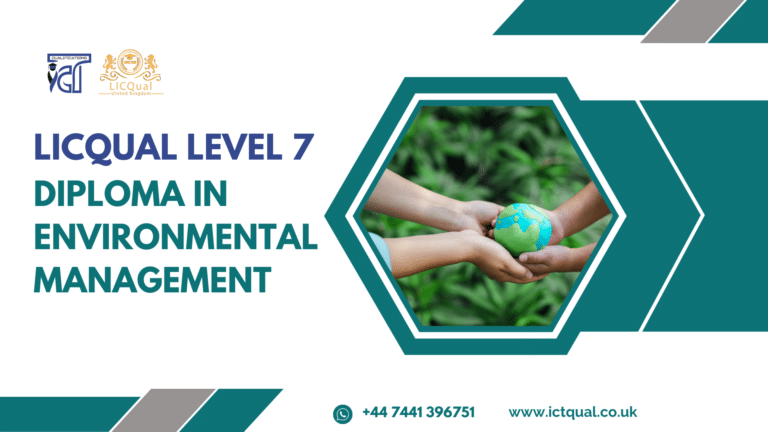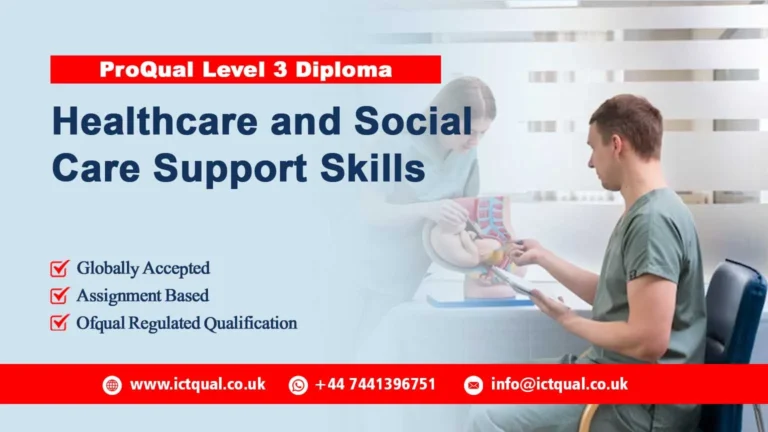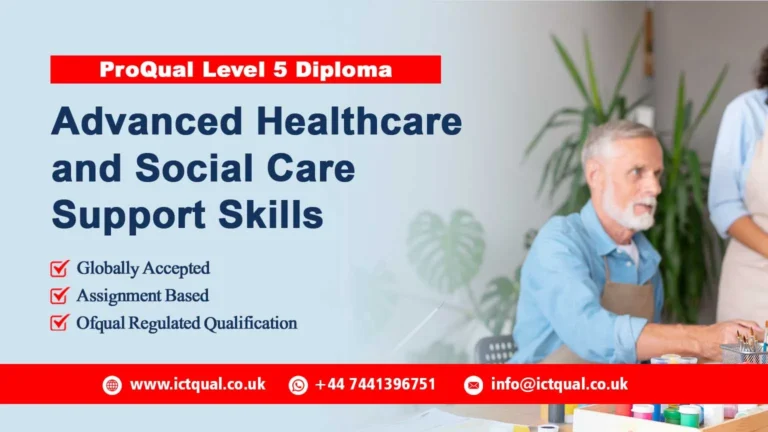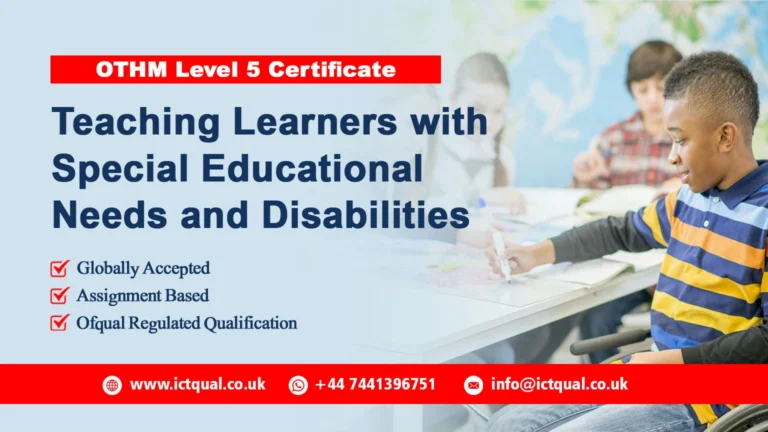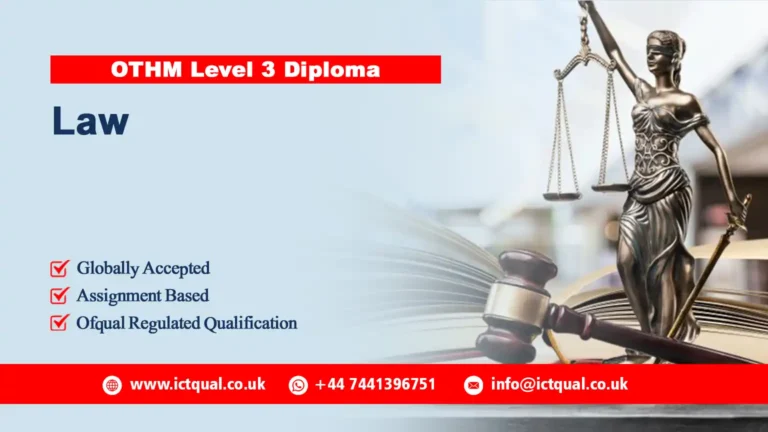In an era where technology is rapidly evolving, the field of software engineering is at the forefront of innovation. With the rise of immersive technologies such as virtual reality (VR), augmented reality (AR), and mixed reality (MR), there is an increasing demand for skilled professionals who can create captivating and immersive experiences. If you’re passionate about technology and want to be at the cutting edge of software development, then the OTHM Level 7 Diploma in Immersive Software Engineering is your gateway to success.
The OTHM Level 7 Diploma is a comprehensive program designed to equip individuals with the knowledge, skills, and expertise needed to excel in the field of immersive software engineering. Participants delve into a wide range of topics, including software development methodologies, programming languages, immersive technology frameworks, and user experience design. Through hands-on projects and practical assignments, learners gain practical experience in creating immersive software applications that push the boundaries of innovation.
One of the key strengths of the OTHM Level 7 Diploma is its focus on practical application. Participants learn to design, develop, and deploy immersive software applications for a variety of industries, including gaming, education, healthcare, architecture, and entertainment. Whether it’s creating interactive VR simulations, immersive training programs, or AR-based mobile applications, learners have the opportunity to unleash their creativity and bring their ideas to life.
The OTHM Level 7 Diploma is not just about learning existing technologies; it’s about shaping the future of technology. By mastering immersive software engineering principles and techniques, participants become catalysts for innovation and change. They have the opportunity to explore emerging trends and technologies, experiment with cutting-edge tools and platforms, and contribute to the development of groundbreaking immersive experiences that revolutionize how we interact with digital content.
Are you ready to unlock the potential of immersive technology and pave the way for the future of software engineering? Enroll in the OTHM Level 7 Diploma in Immersive Software Engineering today and embark on a journey of discovery, innovation, and limitless possibilities. With expert guidance, hands-on experience, and a supportive learning environment, your path to success begins here. Join us and be a part of the revolution in immersive technology!
The OTHM Level 7 Diploma in Immersive Software Engineering is a cutting-edge qualification meticulously crafted to arm individuals with advanced proficiencies in software engineering, focusing particularly on immersive technologies like virtual reality (VR), augmented reality (AR), and mixed reality (MR). This diploma curriculum offers a comprehensive training regimen covering software development methodologies, programming languages, and specialized tools tailored specifically for immersive technologies. Participants undergo rigorous training to conceptualize, develop, and deploy immersive software applications across diverse sectors, including gaming, education, healthcare, architecture, and entertainment.
Through a blend of hands-on projects, practical assignments, and industry-centric case studies, learners immerse themselves in real-world scenarios to hone their skills and master the art of creating captivating immersive experiences. From crafting interactive VR simulations to designing AR-based educational tools, participants gain invaluable experience that enriches their understanding and expertise in immersive software engineering.
The OTHM Level 7 Diploma in Immersive Software Engineering caters to individuals aspiring to thrive in various roles within the burgeoning field of immersive technology. Whether you envision a career as a software engineer, game developer, VR/AR developer, or interactive media designer, this qualification equips you with the requisite skills and knowledge to excel. Moreover, it serves as a launching pad for seasoned professionals seeking to transition into the dynamic realm of immersive software engineering.
Ideal for both recent graduates with a foundation in computer science or related fields and experienced professionals looking to expand their skill set, this diploma offers a transformative learning journey that propels individuals toward fulfilling and impactful careers in immersive technology. With its emphasis on practical application and industry relevance, the OTHM Level 7 Diploma in Immersive Software Engineering empowers learners to become trailblazers in this exciting and rapidly evolving domain.
The OTHM Level 7 Diploma in Immersive Software Engineering consists of 6 mandatory units for a combined total of 120 credits, 1200 hours Total Qualification Time (TQT) and 600 Guided Learning Hours (GLH) for the completed qualification.
Mandatory Units
| Sr# | Unit Title | Credit Hours |
|---|---|---|
| 1 | Security Engineering | 20 |
| 2 | Software programming principles and practices in Java I | 20 |
| 3 | Agile Project Management | 20 |
| 4 | Cloud Computing & DevOps | 20 |
| 5 | Database & SQL Programming | 20 |
| 6 | Web Designing | 20 |
The OTHM Level 7 Diploma in Immersive Software Engineering is designed for a diverse range of individuals who are passionate about leveraging cutting-edge technology to create immersive experiences and innovate in the field of software engineering. This course is ideal for:
- Recent Graduates: Graduates with a background in computer science, software engineering, or related fields who wish to specialize in immersive technologies and embark on a career path focused on creating immersive software applications.
- Software Engineers: Experienced software engineers seeking to expand their skill set and transition into the emerging field of immersive technology, with a particular interest in developing VR, AR, or MR applications.
- Game Developers: Professionals involved in game development who want to enhance their expertise by incorporating immersive technologies into their projects, such as creating VR games or integrating AR features into mobile games.
- VR/AR Developers: Individuals interested in specializing in virtual reality (VR) or augmented reality (AR) development, including creating immersive experiences for training, education, entertainment, or other industries.
- Interactive Media Designers: Designers and creatives who are passionate about creating interactive and engaging experiences, including immersive storytelling, interactive installations, and multimedia experiences using VR, AR, or MR technology.
- Technology Enthusiasts: Individuals with a keen interest in immersive technologies and a desire to explore their potential applications across various industries, from healthcare and education to architecture and entertainment.
Overall, the OTHM Level 7 Diploma in Immersive Software Engineering caters to individuals who are excited about pushing the boundaries of technology and shaping the future of software engineering through immersive experiences. Whether you’re a recent graduate eager to enter the field or an experienced professional looking to stay ahead of the curve, this course provides the skills, knowledge, and opportunities to thrive in the dynamic world of immersive technology.
Here are the learning outcomes for each study unit:
- Security Engineering:
- Understand the principles of security engineering and the importance of implementing robust security measures in software systems.
- Identify common security vulnerabilities and threats, and develop strategies to mitigate risks.
- Implement security controls and mechanisms to protect software applications and data from unauthorized access, exploitation, and cyberattacks.
- Software Programming Principles and Practices in Java I:
- Gain proficiency in Java programming language fundamentals, syntax, and concepts.
- Develop skills in object-oriented programming (OOP) and apply principles such as encapsulation, inheritance, and polymorphism.
- Write efficient and maintainable Java code to solve programming problems and implement software solutions.
- Agile Project Management:
- Understand the principles and practices of Agile project management methodologies such as Scrum and Kanban.
- Learn to plan, execute, and monitor Agile projects, including iterative development, continuous delivery, and adaptive planning.
- Collaborate effectively with cross-functional teams, prioritize tasks, and deliver high-quality software products within time and budget constraints.
- Cloud Computing & DevOps:
- Explore the concepts and principles of cloud computing, including Infrastructure as a Service (IaaS), Platform as a Service (PaaS), and Software as a Service (SaaS).
- Gain hands-on experience with cloud platforms such as Amazon Web Services (AWS), Microsoft Azure, or Google Cloud Platform (GCP).
- Understand the role of DevOps practices in software development and deployment, including continuous integration, continuous delivery, and automated deployment pipelines.
- Database & SQL Programming:
- Acquire knowledge of relational database management systems (RDBMS) and SQL (Structured Query Language) programming.
- Design and implement relational database schemas, tables, and relationships to store and manage data effectively.
- Write SQL queries to retrieve, manipulate, and analyze data stored in relational databases, ensuring data integrity and security.
- Web Designing:
- Learn the principles of web design, including layout, typography, color theory, and user experience (UX) design.
- Develop skills in HTML (Hypertext Markup Language), CSS (Cascading Style Sheets), and JavaScript to create responsive and interactive web interfaces.
- Design and build visually appealing and user-friendly websites and web applications that meet usability and accessibility standards.
Register Now
Fee Structure for OTHM Level 7 Diploma in Immersive Software Engineering
Future Progression
The OTHM Level 7 Diploma in Immersive Software Engineering provides learners with opportunities to advance their careers or pursue further education.
As this qualification is approved and regulated by Ofqual (Office of the Qualifications and Examinations Regulation), learners may be eligible to seamlessly transition to master’s top-up programs at numerous universities in the UK and overseas, potentially with advanced standing.

